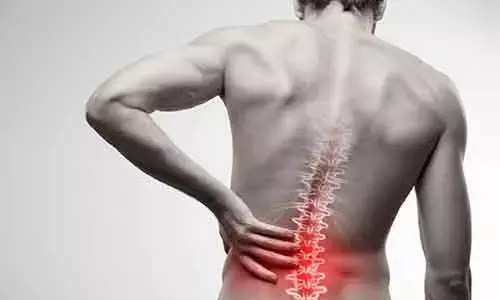- Home
- Medical news & Guidelines
- Anesthesiology
- Cardiology and CTVS
- Critical Care
- Dentistry
- Dermatology
- Diabetes and Endocrinology
- ENT
- Gastroenterology
- Medicine
- Nephrology
- Neurology
- Obstretics-Gynaecology
- Oncology
- Ophthalmology
- Orthopaedics
- Pediatrics-Neonatology
- Psychiatry
- Pulmonology
- Radiology
- Surgery
- Urology
- Laboratory Medicine
- Diet
- Nursing
- Paramedical
- Physiotherapy
- Health news
- Fact Check
- Bone Health Fact Check
- Brain Health Fact Check
- Cancer Related Fact Check
- Child Care Fact Check
- Dental and oral health fact check
- Diabetes and metabolic health fact check
- Diet and Nutrition Fact Check
- Eye and ENT Care Fact Check
- Fitness fact check
- Gut health fact check
- Heart health fact check
- Kidney health fact check
- Medical education fact check
- Men's health fact check
- Respiratory fact check
- Skin and hair care fact check
- Vaccine and Immunization fact check
- Women's health fact check
- AYUSH
- State News
- Andaman and Nicobar Islands
- Andhra Pradesh
- Arunachal Pradesh
- Assam
- Bihar
- Chandigarh
- Chattisgarh
- Dadra and Nagar Haveli
- Daman and Diu
- Delhi
- Goa
- Gujarat
- Haryana
- Himachal Pradesh
- Jammu & Kashmir
- Jharkhand
- Karnataka
- Kerala
- Ladakh
- Lakshadweep
- Madhya Pradesh
- Maharashtra
- Manipur
- Meghalaya
- Mizoram
- Nagaland
- Odisha
- Puducherry
- Punjab
- Rajasthan
- Sikkim
- Tamil Nadu
- Telangana
- Tripura
- Uttar Pradesh
- Uttrakhand
- West Bengal
- Medical Education
- Industry
Pain reprocessing therapy provides pain relief in chronic back pain: JAMA

USA: A recent study in JAMA Psychiatry has reported psychological treatment aimed at changing patients' beliefs about the causes and threat value of pain in patients with chronic back pain (CBP) to be associated with substantial and durable pain relief.
Chronic back pain is a leading cause of disability whose treatment is often ineffective. 85% of cases are of primary CBP for which peripheral etiology cannot be identified, and maintenance factors include avoidance, fear, and beliefs that pain indicates injury. Yoni K. Ashar, Department of Psychiatry, Weill Cornell Medical College, New York City, New York, and colleagues aimed to test whether a psychological treatment (pain reprocessing therapy [PRT]) aiming to shift patients' beliefs about the causes and threat value of pain provides substantial and durable pain relief from primary CBP and to investigate treatment mechanism in a randomized clinical trial.
33 of 50 participants (66%) were randomized to 4 weeks of pain reprocessing therapy and 10 of 51 participants (20%) were randomized to placebo and 5 of 50 participants (10%) were randomized to usual care.
Main outcomes include a one-week mean back pain intensity score (0 to 10) at posttreatment, pain beliefs, and fMRI measures of evoked pain and resting connectivity.
Participants randomized to PRT participated in 1 telehealth session with a physician and 8 psychological treatment sessions over 4 weeks. Treatment aimed to help patients reconceptualize their pain as due to nondangerous brain activity rather than peripheral tissue injury, using a combination of cognitive, somatic, and exposure-based techniques. Participants randomized to placebo received an open-label subcutaneous saline injection in the back; participants randomized to usual care continued their routine, ongoing care.
Key findings include:
- Large group differences in pain were observed at posttreatment, with a mean pain score of 1.18 in the PRT group, 2.84 in the placebo group, and 3.13 in the usual care group.
- Hedges g was −1.14 for PRT vs placebo and −1.74 for PRT vs usual care.
- Of 151 total participants, 33 of 50 participants (66%) randomized to PRT were pain-free or nearly pain-free at posttreatment (reporting a pain intensity score of 0 or 1 of 10), compared with 10 of 51 participants (20%) randomized to placebo and 5 of 50 participants (10%) randomized to usual care.
- Treatment effects were maintained at 1-year follow-up, with a mean pain score of 1.51 in the PRT group, 2.79 in the placebo group, and 3.00 in the usual care group. Hedges g was −0.70 for PRT vs placebo and −1.05 for PRT vs usual care at 1-year follow-up.
- Longitudinal fMRI showed (1) reduced responses to evoked back pain in the anterior midcingulate and the anterior prefrontal cortex for PRT vs placebo; (2) reduced responses in the anterior insula for PRT vs usual care; (3) increased resting connectivity from the anterior prefrontal cortex and the anterior insula to the primary somatosensory cortex for PRT vs both control groups; and (4) increased connectivity from the anterior midcingulate to the precuneus for PRT vs usual care.
"Overall, our findings raise key possibilities about the nature and treatment of primary CBP. Changing fear- and avoidance-inducing beliefs about the causes and threat value of pain may provide substantial, durable pain relief for people with primary CBP," concluded the authors.
Reference:
Ashar YK, Gordon A, Schubiner H, et al. Effect of Pain Reprocessing Therapy vs Placebo and Usual Care for Patients With Chronic Back Pain: A Randomized Clinical Trial. JAMA Psychiatry. Published online September 29, 2021. doi:10.1001/jamapsychiatry.2021.2669
Dr Kamal Kant Kohli-MBBS, DTCD- a chest specialist with more than 30 years of practice and a flair for writing clinical articles, Dr Kamal Kant Kohli joined Medical Dialogues as a Chief Editor of Medical News. Besides writing articles, as an editor, he proofreads and verifies all the medical content published on Medical Dialogues including those coming from journals, studies,medical conferences,guidelines etc. Email: drkohli@medicaldialogues.in. Contact no. 011-43720751


